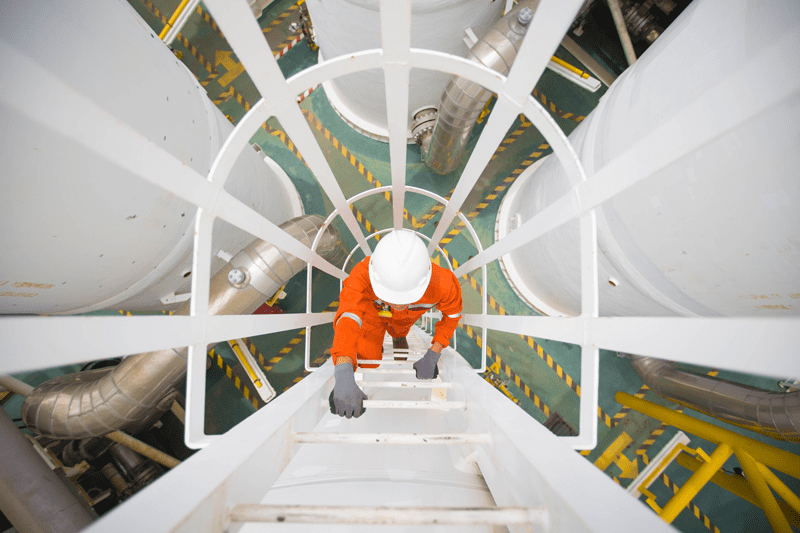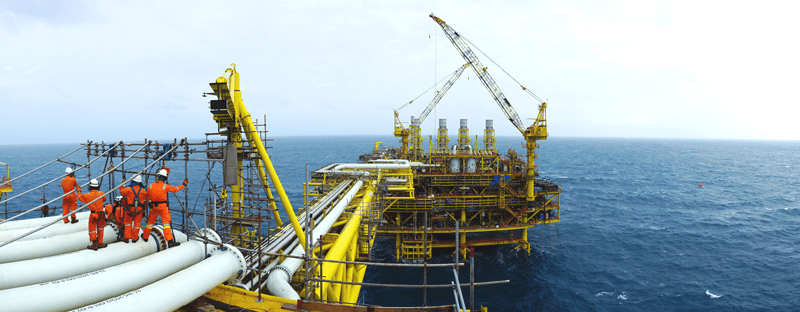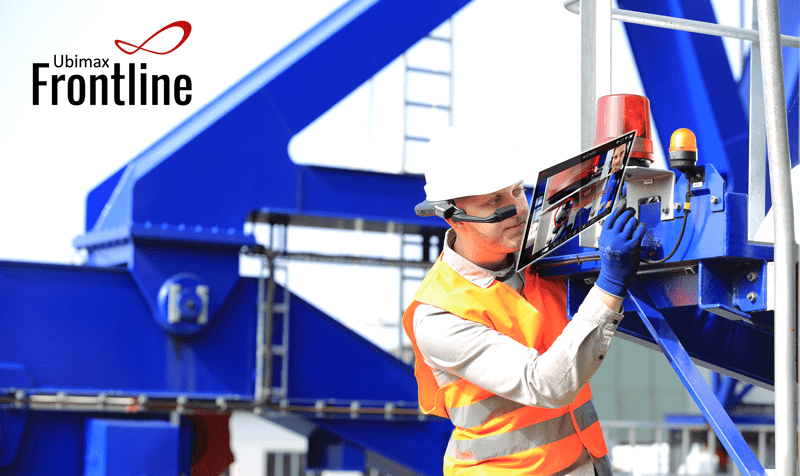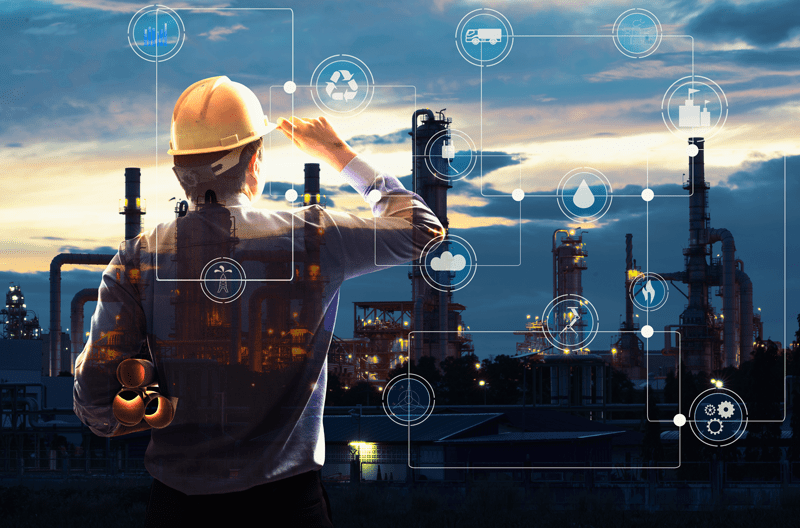Fluctuating oil and gas prices result in an associated pressure to permanently reduce development expenses and ongoing production costs. Digitalization is not only promoted as a solution to this problem but also able to simultaneously make production workflows more efficient. This provides a strong motivation for the oil and gas industry to drive digital working environments forward. After all, an increasing number of companies believe that consistent digitalization is the only way to guarantee their survival. According to a Gartner study, technological transformation and the associated workflows are among the ten trends that are highly relevant for the oil and gas industry in 2019. Another motivator promoting digitalization is the pressure to ensure employees and processes work as safely as possible in order to both prevent accidents and avoid costs and negative media reports when mistakes do actually happen. The introduction of innovative, technological solutions such as AR and wearables has been proven to be suitable for the oil and gas industry. They help resolving many challenges such as guaranteeing personal and process safety, ensuring compliance with standards, and preparing legal maintenance logs.
 Benefits of AR Glasses for Oil and Gas Companies
Benefits of AR Glasses for Oil and Gas Companies
Safety
With regard to safety, using smart glasses is especially beneficial for companies in the oil and gas industry. Employee safety can be improved, and accidents prevented, and at the same time process accuracy can be ensured and regulations can be complied with more easily.
Smart glasses can help improve personal safety and process safety in companies in the oil and gas industry. By seeing displayed safety information and recommendations, employees obtain the appropriate information just when they need it. For example, warnings are shown when they carry out work that involves potential risks of injury. AR smart glasses can also be used for tasks that require a high level of concentration as the information enhances reality. As a result, the employees’ attention is not split, as it would be the case when using notebooks or tablets. A combination of smart and safety glasses is also possible, which is essential for protection from hazards. Since both hands remain free when using smart glasses instead of stationary PCs or tablets, employees can safely carry out tasks such as climbing up and down ladders or inspecting machines with both hands. Furthermore, operational safety checks can be carried out with the help of smart glasses where employees are guided step-by-step. This ensures all items on the checklist are observed. In addition, more detailed information and assistance can be displayed for employees.
Maintenance and Logging
The usage of AR smart glasses reduces maintenance and logging efforts and ensures quality standards especially in the oil and gas industry. The glasses assist employees during maintenance work by displaying information that is appropriate for the respective situation and task. Work processes are then shown step-by-step as they are required and information is displayed exactly when it is needed during the work process. This increases process speeds while also reducing error rates. The support is particularly important during maintenance carried out in difficult environments, such as offshore drilling rigs or maintenance that is not regularly required and is therefore not part of the employee’s routine work. This guarantees a high-quality standard is met. The glasses also help to execute or initiate maintenance tasks for equipment and vehicles, for example, after a specified number of hours in service. For this purpose, data can be pulled from the equipment and be transferred to the glasses through a web interface IoT.
Simple logging of maintenance work and checks through voice commands, photos and videos as well as their reliable storing also helps to improve efficiency. No more paper-based lists are needed and logs are immediately created and saved in a legally compliant manner.
 Training and Expert Assistance
Training and Expert Assistance
When collaborating across production sites and countries, modern AR technologies show another advantage. If a problem cannot be resolved on-site, an expert from anywhere in the world can be called at all times using smart glasses. Through a remote support video call, experts can see on their computer screens what the wearer of the glasses has in his or her field of vision and can give instructions to help solve the problem. While doing this, the expert can mark specific details in the employee’s field of vision in order to facilitate the work. Additionally, technical drawings and instructions can be sent to the smart glasses. All these features can also be used during conference calls with several participants improving remote teamwork for example when coordinating international projects or collaboratively solving tricky repairs.
Augmented reality is an enhanced version of reality. Specifically, this means that additional, relevant information and input are blended into the wearer’s field of vision through wearables (portable, mobile computers) such as smart glasses. Users see the additional content on a display in front of their eyes but are still able to perceive their environments. The complementary information meshes with the reality that smart glasses wearers see in front of them and helps them carry out their tasks.
Reducing Travel Expenses and Ecological Footprint
Another advantage of AR smart glasses for the oil and gas industry is reducing travel expenses, since many workplaces in the industry are very remote. Using smart glasses with a call function makes it much easier to resolve problems on-site by contacting experts remotely. The experts do not have to travel to the location of the problem, which would involve delays and expenses. Instead, they can solve the problem by means of a video call and the smart glasses’ inherent “I see what you see” functionality. The expert can give precise instructions so the problem can be solved quickly and accurately. They can mark specific items in the employee’s field of vision or provide him or her with more detailed materials. This reduces plant shutdown times. Thanks to the reduction of business trips, oil and gas companies not only save costs, they also reduce their ecological footprint by saving CO2 emissions.
Increasing Efficiency
Thanks to faster training, standardized maintenance lists, and remote support calls, AR smart glasses help oil and gas companies to improve efficiency and, as a result, save money. Compared with the rugged notebooks that are often used these days, modern and robust AR smart glasses are less expensive and have a fast payback period. An additional factor when it comes to easy integration and a quick payback, are integrated complete solution from providers like Ubimax. They offer end-to-end solutions including use case-specific AR smart glasses and the associated software as a service, so the devices pay off immediately.
Use Case: AR Glasses for Maintenance of Drilling Rigs and Fracking Equipment
A leading international company in the area of oil exploration and oilfield services, Schlumberger Oil and Gas, has been using AR smart glasses in combination with the Ubimax Frontline software for over a year.
Schlumberger primarily uses AR smart glasses for maintenance of mobile fracking equipment before or after it is used. Employees maintain the vehicles according to a predefined log. One by one, they see each of the steps to be carried out on the glasses. This helps employees to comply with Schlumberger’s quality and safety standards. It also improves efficiency and makes work easier for employees as the maintenance logs are generated in real time using the smart glasses, which reduces the amount of paperwork. Schlumberger has calculated that following instructions on paper lists is 88 percent slower than using a tablet (base scenario). Now, with smart glasses they are not only 15 percent faster than working with a tablet, but also tablets do not allow for hands-free work which is a real problem when employees have to climb onto vehicles or equipment.
 Summary
Summary
For companies in the oil and gas industry, there are many potential use cases for smart glasses with augmented reality support, which several firms have already discovered for themselves. The benefits include:
- Hands-free work with smart glasses that are controlled via voice commands or gestures
- Increased safety for people as well as processes
- Reduced error rates due to step-by-step instructions, e.g., during maintenance and inspection work
- Support for training and remote expert calls possible at all times
- Simpler automated or semiautomated logging of tasks in real time
- Reduced travel expenses and times as
well as a smaller ecological footprint - Avoidance or reduction of downtime
and standstills - Improved efficiency in work processes
- Support in multinational research projects
Thanks to new pay-as-you-go models, companies no longer have to buy their own smart glasses. Instead, they can lease them along with the necessary software and services, which has a positive effect on the cost-benefit ratio.
Photos courtesy of Ubmimax Frontline
Carly Kroll is the Public Relations and Marketing Manager for the Americas at Ubimax Inc. an augmented reality software company specializing in industrial solutions. She can be reached at carly.kroll@ubimax.com or 404-566-2921.







